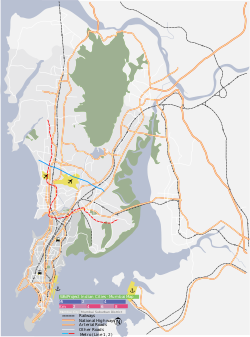 | |||||||||||
| General information | |||||||||||
| Coordinates | 18°57′06″N72°49′07″E / 18.951565°N 72.818633°E | ||||||||||
| System | Mumbai Suburban Railway station | ||||||||||
| Owned by | Ministry of Railways, Indian Railways | ||||||||||
| Line | Western Line | ||||||||||
| Platforms | 4 | ||||||||||
| Tracks | 4 | ||||||||||
| Construction | |||||||||||
| Structure type | Standard on-ground station | ||||||||||
| Other information | |||||||||||
| Status | Active | ||||||||||
| Station code | CYR | ||||||||||
| Fare zone | Western Railways | ||||||||||
| History | |||||||||||
| Opened | 3 September 1868 [1] | ||||||||||
| Electrified | Yes | ||||||||||
| Services | |||||||||||
| |||||||||||
| |||||||||||
Churney Road (station code: CYR) [2] railway station is on the Western Line of the Mumbai Suburban Railway in South Mumbai, Maharashtra. It serves the suburb of Charni Road. The next station south is Marine Lines Station; the next station north is Grant Road Station. Southbound fast locals stop at Charni Road but skip the station during the evening peak hours (17:00 to 20:00). The main significance of Charni Road station is that it is near the Girgaum Chowpatty beach and Marine Drive promenade, a major destination for tourists in Mumbai. It is also important because of the diamond trading industry located here, mainly in the Panchratna and Prasad chambers building near the railway station.





